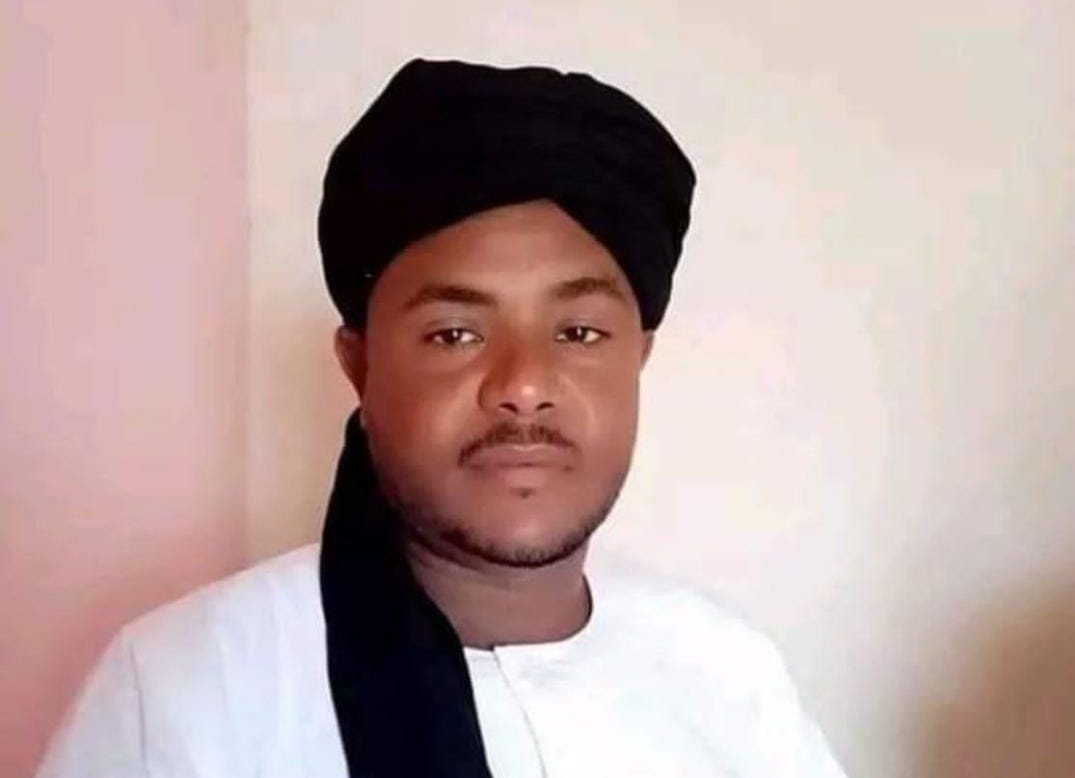Sudanese military intelligence murder lawyer affiliated with anti-war party
Plus: Conflict updates from North Kordofan and North Darfur
Sudanese military intelligence abducted and killed a lawyer and local opposition leader in Al-Jazira State, according to the Political Bureau of the Sudanese Congress Party (SCP), which is a key part of the Taqaddum coalition seeking an end to the war.
“It is with deep sadness that we share the news of the death of one of our most prominent young leaders, Mr. Salah al-Tayeb Mussa (30 years old), may his soul rest in peace. Despite of his young age late Salah Al Tayeb was known to be a brilliant lawyer, a fervent human rights militant and an engaged social activist,” the political party wrote in a statement.
The opposition party blamed the Sudan Armed Forces’ 1st Infantry Division, based currently in al-Managil after being ousted from Wad Madani, saying that an intelligence squad from this Division abducted Salah from his home in Azazi village on April 17, along with other civilians, before torturing him, executing him, and burying him in an unknown location.
SCP condemned the murder as a “heinous crime, which has violated all laws, customs and moral limits.” Other legal organizations likewise condemned the murder and added or corroborated details about it.
SCP stressed that since the start of the “vicious war” in Sudan more than a year ago both the Sudanese army and the Rapid Support Forces (RSF) have engaged in gross and widespread violations against civilians.
“We also urge our friends and partners in the regional and international community to step up their pressure on both warring parties to stop the war and engage in a political process leading to a peace agreement.”
Elsewhere, SAF troops and affiliated intelligence personnel in the city of an-Nahud in West Kordofan carried out a mass arrest campaign last week, targeting civilians and political activists under the pretext of supporting the Rapid Support Forces, cooperating and communicating with them as alleged “sleeper cells,” supplying the RSF with information about the city’s defenses.
Paranoia has swept Sudanese cities in recent months, ever since the surprise attack on the city of Wad Madani and the rapid collapse of the defenses in that city. Security forces have targeted people both on ethnic and political grounds.
A political activist, who preferred to withhold his identity for fear of arrest, told Sudan War Monitor that the security forces arrested more than 50 people in an-Nahud since April. Some of them have been released while others are still in detention, and most of them are political activists from the resistance committees calling only to stop the war through negotiation, according to the source.
Meanwhile, in El Obeid, the General Intelligence Service released on Friday, May 10, Professor Nasraldin Abu Hidaya Karshoum, one of the cadres of the Arab Socialist Baath Party and an employee of the secretariat of the West Kordofan State government, who was arrested on April 19 on charges of loyalty to the RSF and participation in the Kajira conference organized by the leaders of the Native Administration from the Misseriya Humr/Falaita on April 15, during which they announced joining the RSF in the presence of Colonel al-Taj al-Tijani, commander of the RSF in West Kordofan. After this confrerence, the RSF attacked the 22nd Infantry Division in Babanusa, where battles are still raging between the army and the RSF.
Sudan War Monitor was unable to reach Professor Nasraldin Abu Hidaya to obtain his account about his experience during the 20 days he spent in detention.
Sudan’s military junta recently announced an expansion of the powers of the General Intelligence Service, giving them broad powers of immunity, arrest, and inspection, similar to the sweeping powers that they held during the former dictatorship of Omar al-Bashir (1989-2019). This measure rolled back legal reforms made during the years before the current war. Ostensibly, it is a wartime measure needed to combat the Rapid Support Forces, but in fact it is being wielded against political opponents and activists who are calling for an end to the war through negotiations.
Heavy civilian casualties in El Fasher as fighting subsides
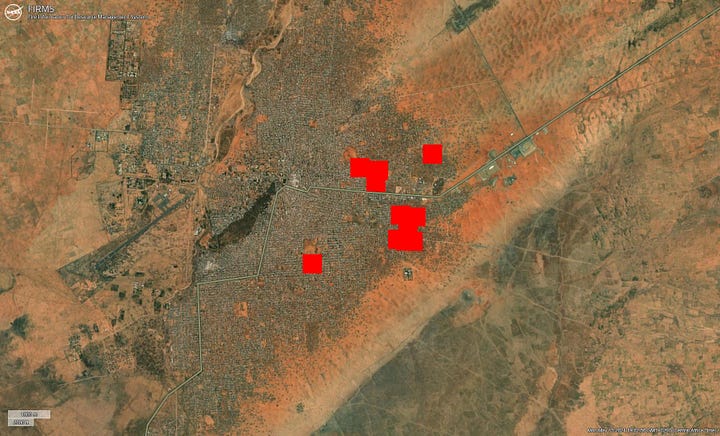
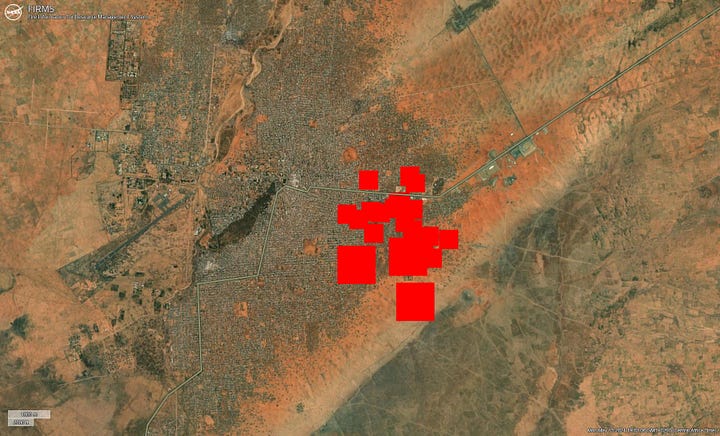
Fighting continued in the North Darfur capital Sunday before calming on Monday. The fighting on Friday alone had caused injuries to at least 160 people who were treated at the El Fasher South Hospital, according to the medical aid organization MSF (Doctors Without Borders), which is supporting that hospital.
Of these 160 injured, 25 were in a terminal condition upon arrival and passed away. The wounded included 31 women and 19 children. The El Fasher Emergency Committee put the death toll somewhat higher at 38, and 189 injured.
Additionally, five displaced people were killed in fighting at Abu Shouk Camp on Sunday, according to camp leaders cited in local media reports.
Videos of the fighting showed troops engaging each other with a variety of light and heavy weapons, inside heavily populated areas, such as this video from the RSF side.
Satellite data also indicated fires in various eastern neighbrohoods of El Fasher.
Two children killed by bombing next to children’s hospital
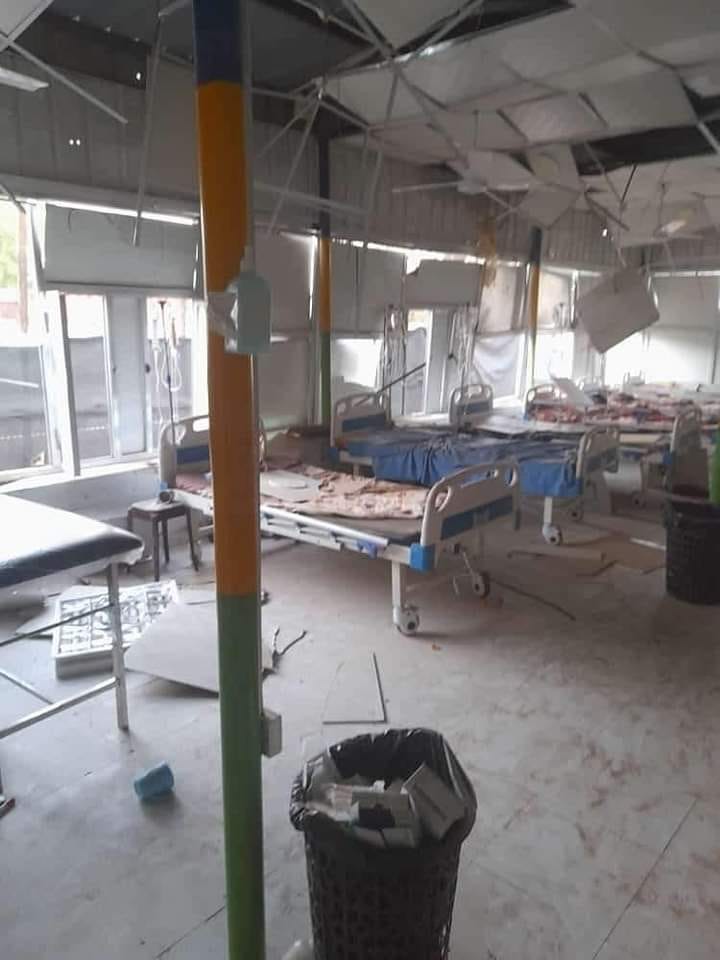
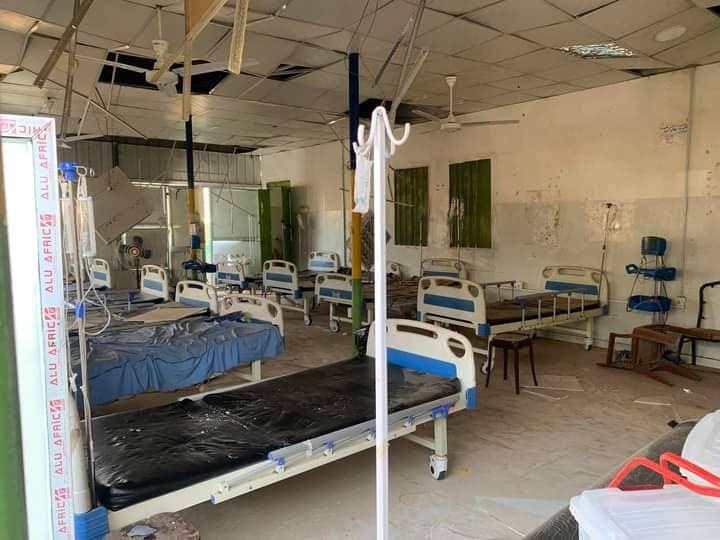
During Friday’s fighting, the roof of the Babiker Nahar Paediatric Hospital in El Fasher, collapsed, killing three people, including two children, according to MSF, which blamed the incident on an airstrike.
MSF said that nearly all of the patients had fled Babiker Nahar before the airstrike—105 of 115 child patients—but ten had remained behind when the hospital was hit.
“Two children who were receiving treatment in our intensive care unit at the paediatric hospital, as well as one caregiver, have been killed as a result of collateral damage following an airstrike by the Sudanese Armed Forces,” said Michel-Olivier Lacharité, head MSF’s emergency operations.
Currently, the hospital is closed and MSF is attempting to treat the remaining patients at a small health clinic that MSF rehabilitated in May and June last year. The organization noted, “Upgrading a small health clinic into a functioning hospital is not an easy task – especially during an active conflict. [Babiker Nahar] was one of the very few children’s hospitals remaining in the whole Darfur region.”
Attack on villagers and livestock
Meanwhile, days after suffering significant defeats in ground fighting in North Kordofan, the Sudan Armed Forces on Saturday, May 11, bombed a village in RSF-controlled territory southwest of El Obeid, striking the village borehole and killing both livestock and civilians that had gathered round it.
We geolocated videos of the aftermath of the attack to al-Moreikib village (13.064031, 30.131208), located 16 km southwest of the El Obeid city center. This is one of several recent attacks apparently targeting the livelihoods of pastoralist communities viewed as supporting the RSF, including an attack on a watering point in North Darfur that killed hundreds of camels.
Power outages and high prices in North Kordofan State
In another development in North Kordofan, the state today witnessed power outages for the sixth day in a row, Radio Dabanga reported, saying that aircraft on Monday bombed a major electrical transformer in the city of Umm Rawaba. The RSF continue to control the main El Obeid power station and have not responded to appeals by city notables to allow engineering maintenance teams to repair faults at the station.
Citizens are also suffering from a rise in the prices of basic commodities since the battles that took place between the army and the RSF in Mount Kordofan and the eastern Um Rawaba region last week, during which hundreds of soldiers were killed.
Citing a commercial source, Radio Dabanga reported that “commercial activity had completely stopped, and not a single vehicle loaded with goods had entered the city since the battles of Mount Kordofan and Wad Ashana.”
Report on the Nuba Mountains
A new report by Small Arms Survey explores the effects of the ongoing conflict on the Nuba Mountains region, including the role of the SPLA-North, the rebel group formerly linked to South Sudan’s now ruling party, which controls parts of that region.
The report, “Nuba Hopes and Fears: Fuelling SPLA-North Mobilization in South Kordofan,” warns that the national conflict is pressuring communities to take sides in the war, tearing at the fragile social fabric, which will not be easily repaired.
“The continued ethnicization of the larger conflict in Sudan will see the onset of conflict at the community level in South Kordofan, destroying fragile social fabric and entrenching conflict, making it far harder to resolve. The Nuba in South Kordofan have long sought greater autonomy from an oppressive, menacing Khartoum; the significant deterioration of intercommunal and interracial relations as a result of the war fuel hopes for greater independence and the prospective break-up of the Sudanese state.”
The report also touches on the humanitarian situation, noting that fighting in South Kordofan has blocked key arterial roads, dramatically worsening an already existing shortage of food and medicines. The conflict has disrupted “peace markets,” where traders come together from SAF-controlled and SPLA-controlled areas, though some of these are still operating.
The report was prepared before the latest talks in Juba between Sudan’s military and the SPLA-North leader, Abdel Aziz al-Hilu.
The full report is available for download here:
News in Brief
The Saudi Arabian and Sudanese finance ministers held talks yesterday during preparatory meetings for an economic meeting of the League of Arab States, amid efforts to restart the Jeddah peace talks, which were suspended last November. Sudan’s Finance Minister Jibril Ibrahim also met with the Qatari Ministry of Finance underesecretary and the Bahraini minister of finance.
Meanwhile, the deputy chairman of Sudan’s Sovereignty Council, Malik Agar, met with the Kuwaiti ambassador in Port Sudan today. They discussed “cooperation and consultation in the political sphere between the foreign ministries of the two countries,” as well as Kuwait’s ongoing humanitarian efforts in Sudan. Historically, Sudan’s governemnt closely depended on Saudi Arabian and Gulf states for fiscal support, which gives them leverage as mediators. Yet the Arab states have failed to bring the Sudan’s military junta back to the negotiating table.
Some observers recently questioned Saudi neutrality after video clips surfaced of RSF troops in the Kingdom sending messages of support to their fellow fighters back in Sudan and graduating from an artillery training. Sudanese Ministry of Foreign Affairs summoned Saudi Ambassador Ali bin Jaafar to discuss the controversial video. According to the foreign ministry, the Saudi ambassador downplayed the video, saying it was a few months old and documented a routine training exercise of RSF troops involved in the anti-Houthi coalition battling in Yemen. The Saudi and UAE government have employed RSF troops as mercenaries in Yemen since before the current Sudanse civil war.
SAF shot down an RSF drone in the Um Dalka area near the Sennar Sugar Factory.
Sudan Tribune reports that residents returning to Omdurman neighborhoods formerly occupied by the RSF found a “secret execution chamber.”


